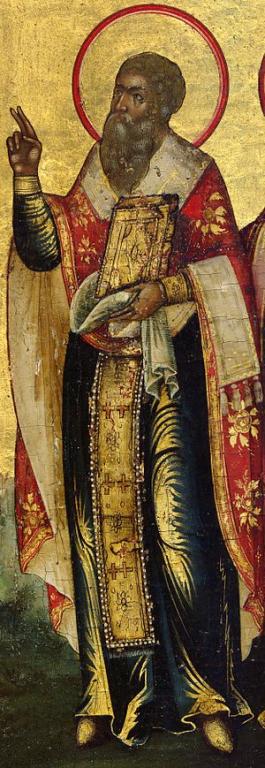Yesterday at the great family Christmas feast I had a longer than I would have liked conversation with one of the relatives. Don’t get me wrong, I like him, for the most part. But, he has an annoying, actually a seriously annoying inclination to “left wing” conspiracy theories. At least we’re roughly on the same page, wing-wise. However, when he gets that expression in his eyes and proceeds to explain in detail the suppressed truth of one thing or another, usually involving a cabal, I start to get nervous, and my own eyes glaze, if not dart around looking for an escape. And, of course, eventually, he did.
And then this morning as is my wont, I reviewed Wikipedia’s listing of events that occurred on the 26th of December I saw that some or most Orthodox celebrate today at the feast of St James the Just. (Actually there are just tons of options. In the Roman calendar this particular feast is observed on the 3rd of May, while the Anglicans like the 1st of May, except for the American ones, as well as Lutherans and some Orthodox who prefer the 23rd of October…)
And, as it happens, James sits at the center of my personal favorite Christian conspiracy theory.
It is my contention that James, sometimes called the Just, at other times the Great, and is also called the brother of Jesus, was in fact Jesus’ biological brother, and that when Jesus was killed, inherited the church. Not the apostles. Certainly not Paul. James.
In Paul’s various letters where he references his raising money for the “poor” in Jerusalem, he is actually raising money for the central organization, which appears to have called itself the Poor, as in Ebionites. The Wikipedia article on this lost sect summarized them as a “Jewish Christian movement that existed during the early centuries of the Christian Era. They regarded Jesus of Nazareth as the Messiah while rejecting his divinity and insisted on the necessity of following Jewish law and rites. The Ebionites used only one of the Jewish Gospels, revered James the Just, and rejected Paul the Apostle as an apostate from the Law. Their name suggests that they placed a special value on voluntary poverty.”
The article goes on to observe “Since historical records by the Ebionites are scarce, fragmentary, and disputed, much of what is known or conjectured about the Ebionites derives from the Church Fathers, who wrote polemics against the Ebionites, whom they deemed heretical Judaizers.” And so as the article states any opinions about them are ultimately conjecture, there can, however, be educated conjecture. And what we do know is there is a person named James, who is called Jesus’ brother, who is the head of the organization in Jerusalem until he is killed. If one does not assume Paul’s religion that he built up among converts away from Jerusalem and environs, was anything more than one of a number of ideas and organization, then the hints are tantalizing, and do incline a reasonable person in certain directions.
I have to admit how I also like that James is the putative author of the Epistle given his name, much hated by Luther and others for stating that without actually doing something, one’s faith is worthless. To the degree the epistle reflects James’ actual teachings it must have been a royal annoyance to Paul who put all his eggs in the faith only basket. That it survives in a document dominated by follower’s of Paul suggests its importance as maybe representing the original teachings of the original organization. Now, sadly, gone. Replaced by, well, you know what is called Christianity today.
My belief is pretty strong that James, the natural brother of Jesus, inherited the organization when Jesus was murdered. And that while he consulted with the apostles, he was the final arbiter until his own death. Even then the organization passed to another blood relative, a cousin. However, not long after James’ death Jerusalem was sacked and those not killed were dispersed, and in the chaos that followed, the Jewish Christian Ebionites fell apart and the gentile communities founded by Paul filled the void and became normative Christianity.
Not, in my opinion, a move for the better.
Sadly, I find I’m happy to explain this to people until someone’s eyes glaze over. And makes me feel I should probably be a little more tolerant of my relative’s little speeches. Although at least mine is shorter…













